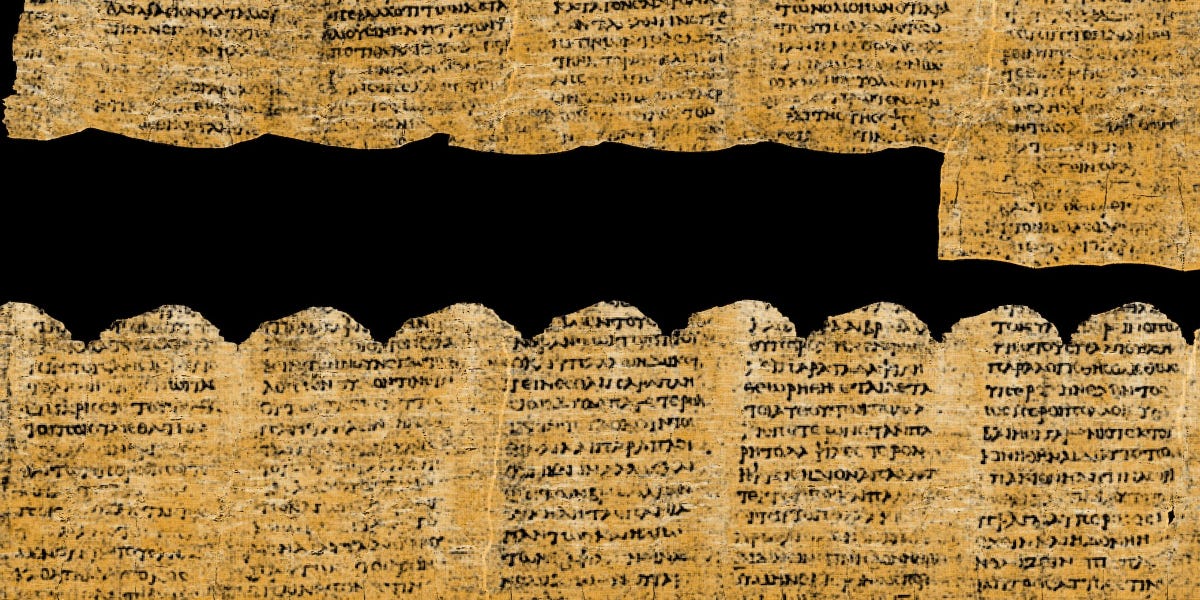In many ways, the ChatGPT era has opened people’s eyes to the ways in which artificial intelligence can help them accomplish tasks at home, in class, or at work.
But if that’s all you think the algorithms are limited to, think again.
A pair of developments this month have shown how AI can help humans peer far beyond the peripheries of space and time they’re familiar with to deliver real-world impact.
On Monday, it was revealed that a team of researchers had used machine learning to solve one of archaeology’s longest-enduring mysteries by decoding a near 2000-year-old scroll that was almost lost to the eruption of Vesuvius in 79 AD.
The scroll, part of the Herculaneum papyri first discovered in a villa close to Pompeii in the 18th century, survived just enough for researchers to make it a subject of intense interest as they sought to decipher any bit of information they could from it.
Those efforts struggled to make headway until former GitHub CEO and Ancient Rome enthusiast Nat Friedman became aware of its existence.
He made it his mission to uncover the scroll’s secrets by setting up a competition called the Vesuvius Challenge that invited researchers to use AI techniques like machine learning and computer vision to “resurrect an ancient library from the ashes of a volcano.”
The efforts seem to have paid off.
A trio of researchers hailing from the US, Egypt, and Switzerland won $700,000 after using AI to analyze high-resolution CT scans of the rolled-up scroll, a remarkable feat given the damage that would be caused by attempting to unroll any one of these “lumps of carbonized ash.”
What they managed to decipher amounts to about 5% of one scroll, equivalent to around 15 columns of text that the Vesuvius Challenge says describe “pleasure” — a concept understood as “the highest good in Epicurean philosophy.”
AI is paving the way to the future too
As well as seeing AI be used to excavate the past, it seems to be getting used to forge a path to the future too.
The same day the Vesuvius Challenge unveiled its winner, Bill Gates and Jeff Bezos-backed company KoBold Metals shared that AI played a key role in its discovery of a copper deposit in Zambia that could be the country’s largest find in 100 years.
Copper is a vital metal for various components in electric vehicles, making it one of the most in-demand materials today. However, analysts have warned that prices of copper could jump as much as 20% by 2027 due to a shortage of supply.
According to the company, the “majority of easy-to-find deposits have already been discovered,” which means prospecting “mineral deposits of the future” will require looking deep underground.
Its process for doing this involves using AI to crunch geoscience data about the Earth’s crust — as well as maps and other historical documents — to allow their researchers to start figuring out if there are any deposits hidden in plain sight.
The AI can model all this data into a map-style rendering that then allows the company to decide on locations that might hide deposits.
KoBold Metals president Josh Goldman reckons that the AI-led discovery represents “one of the world’s biggest high-grade large copper mines,” having compared it in size to the Kakula mine in the Democratic Republic of Congo, which produced 393,551 tonnes of copper in 2023.
Clearly then, billions of dollars aren’t just being spent on AI for the sake of achieving some productivity and efficiency hacks. AI could also help usher humans into a new age of discovery.
Read the full article here





